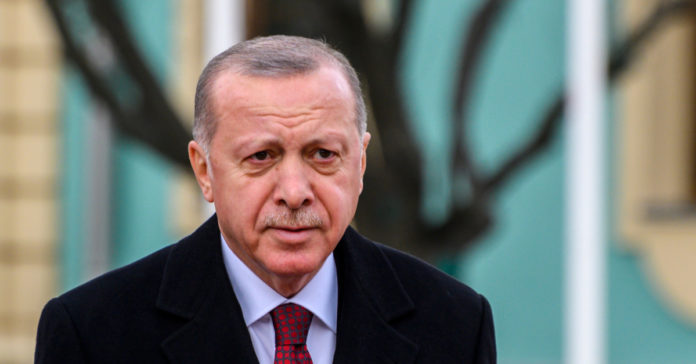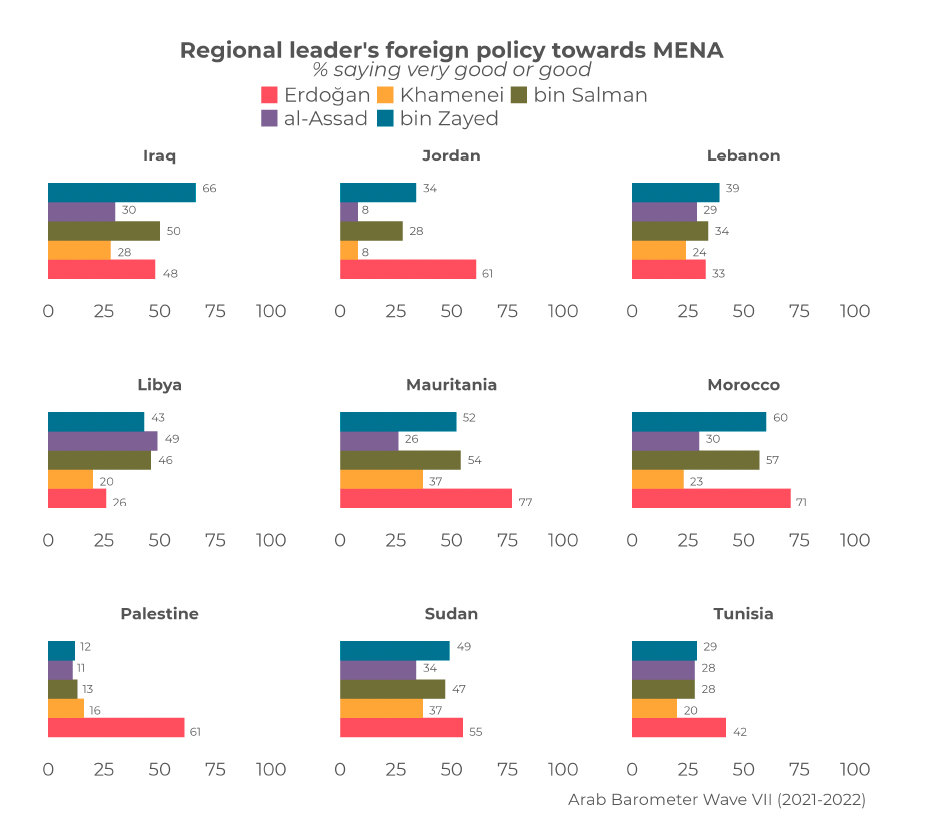Turkish president Recep Tayyip Erdogan is the most popular leader among citizens in the Arab world while Ayatollah Khamenei of Iran is the least popular, according to a new survey.
The Arab Barometer survey found that in six out of nine countries (Jordan, Mauritania, Morocco, Palestine, Sudan and Tunisia), Erdogan has the highest support of any leader.
Yet despite his relative overall popularity, attitudes towards Erdogan are not as positive as they once were – approval of his foreign policy towards the MENA region has dropped 23 points in Sudan, 16 points in Jordan, 12 points in Palestine, and 11 points in Tunisia.
While Erdogan’s popularity is the highest overall, his regional rivals Saudi Crown Prince Mohammed bin Salman and Emirati Crown Prince Mohammed bin Zayed are the next most popular.
Bin Salman and bin Zayed’s popularity are often statistically equal, but bin Zayed tends to be slightly more favoured.
Bin Zayed is the most popular leader in two of the three countries that did not favour Erdogan (Iraq and Lebanon).Overall, 66 percent of Iraqi citizens say bin Zayed’s policies are “good” or “very good.”
Subscribe to our newsletter and stay updated on the latest news and updates from around the Muslim world!
Of the five regional leaders Arab Barometer asked citizens to evaluate, Syrian President Bashar al-Assad and Iranian Supreme Leader Ali Khamenei typically are the least popular.
Assad tends to be more popular than Khamenei, however. Only in Palestine (16 percent versus 11 percent) and Mauritania (37 percent versus 26 percent) is Khamenei significantly more popular than Assad.
In recent years, Iran has focused building relationships with African countries, which has included starting bilateral talks with Mauritania.
Meanwhile, Assad notably comes in as the most popular regional leader in Libya with 49 percent of Libyans saying his policies are “good” or “very good.”
In Tunisia, Assad’s approval (28 percent) is tied with that of bin Salman (28 percent) and bin Zayed (29 percent).
Arab barometer said: “The significant drops in Erdogan’s popularity across the region come at a time when Turkey is losing its fight to keep inflation under control. Turkey’s financial crisis hit new levels in June with inflation topping 78 percent according to Turkish estimates. The foreign reserves of Turkey’s central bank have dropped perilously low, causing Erdogan to work towards normalising relations with his longtime rivals and next most popular leaders, Mohammed bin Salman and Mohammed bin Zayed…
“In only three countries did support for Erdogan rise significantly since Arab Barometer surveyed the region in 2018 and 2019: Morocco (11 point increase), Iraq (10-point increase) and Libya (5-point increase). The support for Erdogan in each of these countries is likely tied directly to Turkish policy toward each country. For example, Moroccans’ support for Erdogan can easily be linked to Erdogan’s repeated public support of Morocco’s claim on the Western Sahara.
“In Libya, Turkey has intervened directly in the ongoing civil conflict. Many have called for the removal of Turkish forces, which is likely linked with the low level of overall popularity. However, the increase in support for Erdogan is found entirely due to increasing support in the West of the country. Turkish soldiers have played a vital role helping establish control for the UN backed government. Overall, 31 percent of Libyans who live in the West say Erdogan’s policies are “very good” or “good” compared to only 18 percent of Libyans in the South, and 13 percent of Libyans in the East.
“A similar regional story can be seen in Iraq. In the Iraqi government-controlled regions of the country, 51 percent of Iraqis support Erdogan compared to only 17 percent of Iraqis in Kurdish regions. This is unsurprising, as Erdogan vehemently opposes the creation of any Kurdish state.”




















